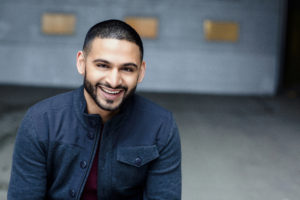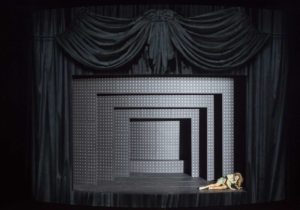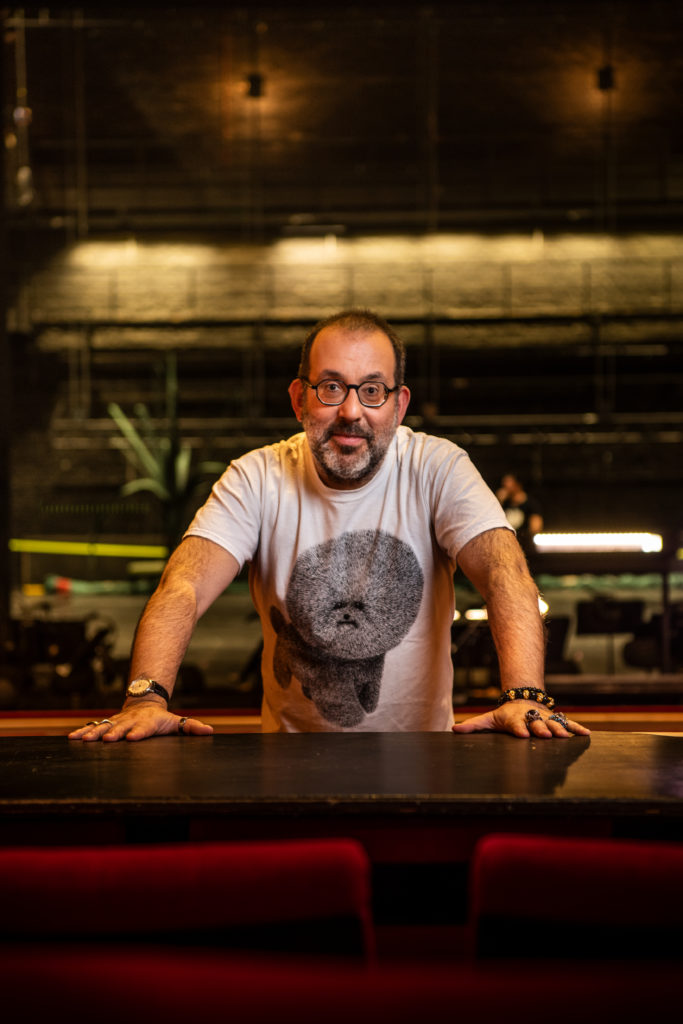
Photo: Jan Windszus
What do you do when all the energy you’ve put into careful planning over many years is suddenly threatened? Barrie Kosky decided to wipe the board clean and start again. The new autumn programme at Komische Oper Berlin (KOB) as a result of the coronavirus pandemic means, for the busy Intendant, a tangle of what he calls “scheduling nightmares” but also opens the door to new possibilities, for artists and audiences alike. It’s a purposeful step into the unknown, something the self-described “gay, Jewish kangaroo” is well used to doing after three-plus decades of working in theatre.
As head of the Komische Oper Berlin since 2012, Kosky (who has been called “Europe’s hottest director“) has made it a mission to regularly stage early 20th century operettas, Baroque opera, musicals, Mozart, and 20th century works. The pervasive idea of opera being an art form designated entirely for certain classes is one that niggles Kosky; he told The Telegraph in 2019 that “it fits a cultural agenda to say it’s elitist, but it is bullshit.” The idea that a work of art is challenging, entertaining, and enlightening at once is, in Kosky’s world, good, and entirely normal; just how much the bulbs for any or all of the elements in this trinity are dimmed or brightened depends, of course, on the material, but just as equally, the context. Berlin’s history, and indeed, that of Germany, have been constant sources of inspiration and exploration, and have often provided a meaty subtext to Kosky’s stagings, notably in his 2017 Fiddler on the Roof, here called Anatevka, with its unmissable, and purposefully uncomfortable, recalling both distant and recent pasts. His 2015 staging of Schoenberg’s Moses und Aron featured imagery which disturbingly recalled the Holocaust. This bold combination of vision, politics, and thoughtful imagination (and in many cases, reimagination) is what has largely fuelled the incredible success KOB has enjoyed over the course of Kosky’s tenure, which is set to end in 2022. Before then, the company’s re-envisioned autumn program is a concentrated symbol of all Kosky has, and hopes to still, accomplish, both within and outside of Berlin proper. The new slate of programming is ambitious: there will be minimalist stagings of Schoenberg’s Pierrot Lunaire, Offenbach’s opéra bouffe The Countess of Gerolstein, Gluck’s Iphigenie auf Tauris, Schumann’s Mondnacht, and the operetta Die Blume von Hawaii by Paul Abraham; concert performances of works by Schubert (the song cycle Winterreise will be performed by ensemble baritone Günter Papendell) and Kurt Weill (with singer/actor Katherine Mehrling); a three-concert series devoted to the works of Igor Stravinsky (led by Music Director Ainārs Rubiķis); a series of salon talks combining science, creativity, and social issues; dance presentations (including choreographer Emanuel Gat’s SUNNY by Staatsballett Berlin); and a video project by Gob Squad (a British-German collective specializing in video/performance collaborations) which will use Berlin as a backdrop tot explore perceptions around the comfortably familiar.
That sense of comfort is not, as a concept, something Kosky has ever spent time or energy presenting or encouraging. In a conversation with James Clutton (Opera Holland Park’s Director of Opera) earlier this year, he compared the overall position of KOB to Berlin’s other two opera houses, noting that “Deutsche Oper is Moby Dick, Staatsoper (Unter den Linden) is Jaws, and… we’re Flipper.” It’s Kosky’s smart, sassy, singular way of illustrating the vivid approach of the house and its sparky Intendant to the material they program and the artists (both ensemble and guests) they engage. The longtime director’s style – if he could be said to have one – busily combines color, movement, and drama in a vivid theatrical aesthetic, colorfully aided by the work of longtime collaborators, including choreographer Otto Pichler, set designer Rufus Didwiszus, costume designer Klaus Bruns, set and lighting designer Klaus Grünberg, and designer Katrin Lea Tag. Embracing strong imagery and dramatically rich theatricality, Kosky is unafraid of upsetting the apple cart of operatic expectation; in fact, it’s something of a specialty of his, to purposefully turn it over, kick the wheels, collect the apples, and go off to make something considered delicious by some and unpalatable by others. Not everything he does is easily digestible, but then, it isn’t supposed to be; Kosky’s oeuvre as an artist is to question perceptions and long-held beliefs, which sounds simple enough but is no small thing in an industry constantly pressured to hew to so-called “safe” programming and presentation. While expanding the possibilities of live presentational experience, great attention is given to small details within a larger overall narrative framework. His 2017 production of Die Meistersinger von Nürnberg, for instance, contextualized the very place in which it was presented – Bayreuth – in order to question notions of identity and creativity; utilizing puppetry and a backdrop of the Nürnberg trials, Kosky put the opera’s composer on trial. As Martin Kettle noted in The Guardian “(a)t the heart of this Meistersinger is an imaginative, subtle and serious staging of a simple question: how far does Wagner’s antisemitism invalidate his artistic achievement? In the end, Kosky proves to be a fair judge of a question that is still necessarily debated.”
Creative probing into the nature of creation, ideas of artistry, and the role(s) of context within all of them reveal pursuits at once serious (Schoenberg’s unfinished 1932 opera Moses und Aron) and gloriously silly (Oscar Straus’ frothy 1923 operetta Die Perlen von Cleopatra), with a particular penchant for combining surreal dreamscape visions with unapologetic disruptions to socio-religious (and operatic) norms. His 2016 production of The Nose by Dmitri Shostakovich for the Royal Opera Covent Garden famously featured a line of tap-dancing title characters, while the 2015 staging of Prokofiev’s The Fiery Angel for Bayerische Staatsoper revealed (nay, revelled in) an even more surreal, grotesque world where the personal and political intersect. The production, which was to have been presented at the Metropolitan Opera this December (cancelled because of COVID19), features a sparring, obsessive couple, and delves into the subconscious of each to reveal a parade of decadent, deprived fantasies that strip away the eroto-goth, pseudo-romance of Valery Bryusov’s breathless 1907 novel. Fierce, ferocious, and at times suitably unfathomable, the memorable production was not only notable for its comically nightmarish vignettes (one of which featured a very sarcastically-presented penis being roasted and consumed) but for the genuine interest Kosky took in the depiction of the opera’s female character, Renata, an interest which applies more broadly to the many pivotal female characters within the works he’s helmed. Paul Abraham’s 1932 operetta Ball im Savoy, staged at KOB in 2013, featured the inimitable Dagmar Manzel (a company mainstay) as Madeleine de Faublas, who clings desperately to an elegant dignity while trying to keep her marriage afloat; Jacques Offenbach’s opéra bouffe Die schöne Helena (known more for its French title La belle Hélène, and staged at KOB in 2014) offered a fascinating depiction of its title character, one touching on vampy, vapid, scary, silly, and girlish. Monteverdi’s Die Krönung der Poppea (in its original Italian, L’incoronazione di Poppea, with the Komische using a richly reimagined score by composer Elena Kats-Chernin) portrayed the title character’s ruthless and naked (sometimes literally) ambitions with zealous, bloody clarity. Franz Schreker’s 1918 work Die Gezeichneten (staged in 2018 at Oper Zürich) Kosky presented Carlotta through the disturbed, damaged perceptions of the male character obsessed with her, creating a twisted parable that hinged, like much of his work (notably his Pelleas et Melisande staging in 2017), around the dialectics of male desire, female identity, power, subservience, and beauty.
Nowhere, perhaps, were these angular explorations made more clear than in Kosky’s highly divisive staging of Carmen, first presented at Oper Frankfurt and subsequently at the Royal Opera in 2018. Kosky purposely stripped away the opera’s historical visual cliches (farewell fans and flamenco!) while mocking the audience’s expectations of them. Instead of the cliched-sexy, wide-eyed, wink-wink-nudge-nudge choreography so often (almost constantly) deployed as a central part of the character – as embodied in the famous habanera – Kosky’s Carmen was a kind of toreador herself, and during the aria itself she wasn’t swaying hips but peeling off a gorilla costume – gimmicky perhaps, but a deliberate nod at Marlene Dietrich’s similar revelation in Blonde Venus, with its balance of power, desire, and subversion of expectation, and a smirking (if highly confrontational) shove at long-held, seemingly immobile notions of what constitutes “sexy” in female operatic depiction. The moment – indeed the entire production – underlined Kosky’s love-it-or-leave-it approach. 2021 will see the Australian director helm a highly-anticipated new production of Der Rosenkavalier for Bayerische Staatsoper together with his regular team, and conductor Vladimir Jurowski, with whom he has previously worked several times, including, most recently, at Komische Oper Berlin last autumn, for a visceral staging of Henze’s 1965 work The Bassarids. There is no small amount of anticipation for next year’s Rosenkavalier; it follows Otto Schenk’s widely-adored, Rococo-style production, first presented at the house in 1972. The production will also mark Jurowski’s first staging at the house since being named the company’s General Music Director Designate (formally starting in autumn 2021); soprano Marlis Petersen is set to sing the role of the Marschallin. The production is set to open in mid-March of 2021.
Before that, however, is the re-envisioned autumn season in Berlin, a brave step into what is a largely unknown world still grappling with the effects of pandemic; how much audiences will respond is anyone’s guess, though the combination of a faithful live audience, and a growing digital one (thanks to a partnership with Opera Vision) means the company will continue to grow its presence in both local and global respects. When we spoke recently, Kosky had just returned to Berlin from finalizing lighting plans for a future production at Festival d’Aix-en-Provence. (“Who would say ‘no’ to a week in the South of France?” Well, especially right now… “Hello!”) This was my second conversation with Kosky, the first having been in early 2018 when we chatted about the central role of operetta in his programming. Funny, warm, blunt, and chatty, Kosky is a lively conversationalist with none of the I’m-A-Famous-Artiste characteristics that might trail from a figure of his stature. Authenticity is a theme which has emerged through the many conversations I’ve been privileged to share with various classical figures, and I can think of no better figure to embody such a quality than Kosky; he is real, earthy, wholly himself, wholly authentic, with a like-it-or-lump-it boldness that will either engage or repel. It’s not difficult to figure out which camp many opera fans sit in, myself included. Here the director shares his thoughts on the whys and wherefores of changing programming, what the pandemic hath wrought in terms of acceptance and humility, the logistics of funding, upcoming projects (including Rosenkavalier in Munich), and just how his dedication on an April episode of Hope@Home came to be.
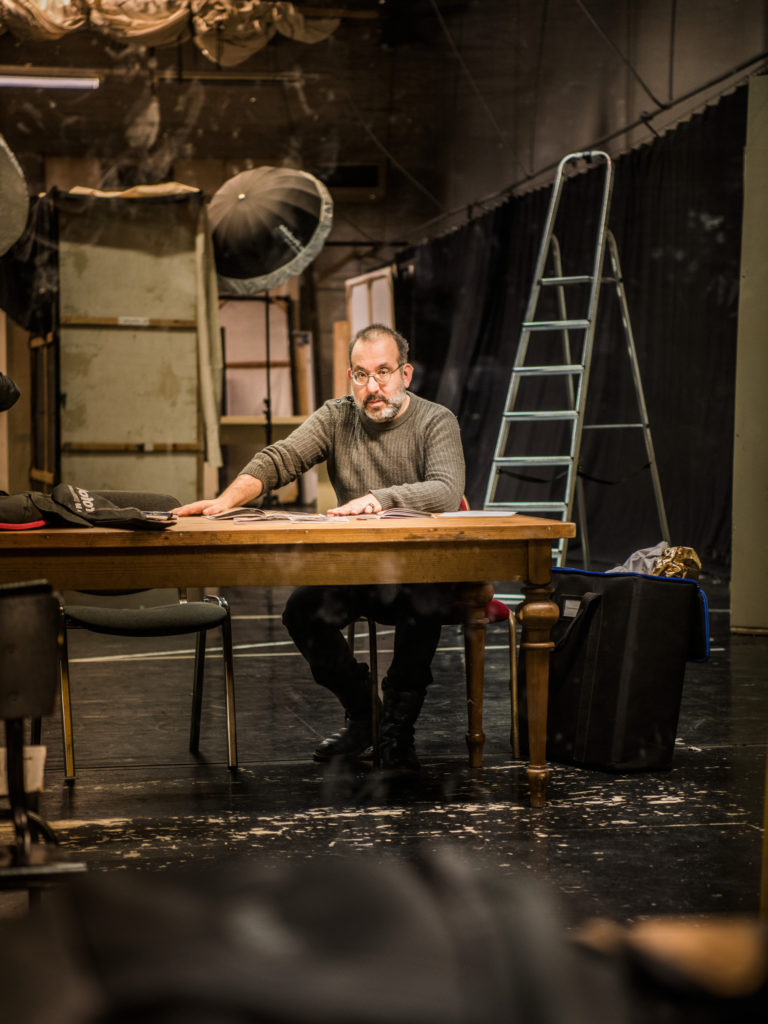
Photo: Jan Windszus Photography
Why did you redo the schedule from September through to the end of the year?
We decided we just couldn’t mess around. Some of my colleagues are all hoping by October we’ll all be back to normal, but I think they’re living in la-la land – it’s impossible. We have a luxurious thing you don’t have in North America or Britain: the subsidized ensemble system. It enables us to be able to do things so we don’t have to spend a cent, and we don’t have to employ people – they’re all here.
I read somewhere you’d said how artists who are complaining in Germany have no idea about how bad things really are elsewhere…
Oh… yes, it’s my pet thing at the moment! It’s like, I just find that this German word, “jammern”, it’s like this, well, more than complaint, this … <whining noise>… and you know, I understand any freelance artist can do that if they’ve lost jobs. I have no problem if friends of mine, freelance friends, do it – they can complain twenty-four hours a day if they have no money. But for people within the system who are getting their full monthly payment and doing no work – like the orchestra, like the chorus, like the soloists, like the technicians – you know, shut the fuck up. Really. I don’t even want to hear about your difficulties – you have none, you’re being paid and not working. And then they say, “We miss performing!” And I say, “Go stand in front of an old folks’ home and play your violin like so many other people are doing!” When I speak to all my friends in America, Canada, Australia, Britain, they’ve just lost six months of work! Some of them fall between the funding slots so they can’t apply for financial help! So… really.
Comparatively speaking , I think many classical artists outside of Germany look in with envy because of the system being much more well- funded.
Well it is. The system is stronger, and the financial packages are bigger – Merkel announced €1 billion for the arts, but that’s on top of hundreds of millions the city gave, and on top of the billions they give to the arts anyway.
Is it true you don’t like the term “reduced” opera? That seems to be what many organizations are doing, or thinking of doing, right now.
I mean, I don’t think if something is small that it’s “reduced.” Certainly if you have a reduced Ring Cycle, like the one by Jonathan Dove, it’s a reduced orchestration, but what we’ve deliberately done is not that, even though we may be using smaller forces. Some of the best pieces of music ever written are small, and quite frankly, if we have to have a six-month pause from Mahler, well, there’s too much Mahler being played anyway – it’s lost its specialness being done so much. But more Mozart, Beethoven, Mendelssohn and Bach wouldn’t hurt anybody! Not everything has to be monolithic – but “reduced” is a word that implies things that I don’t want to imply. We all know what the situation is, and I feel it’s better to say, “We’re doing a version of The Countess Of Gerolstein” and not “We’re doing a reduced version” – I don’t like that word “reduced.” I’ve tried to ban it.
The needed move into these smaller versions of things highlights an intimacy within the overall experience which audiences may have been craving – this idea that opera and classical must always be so grand and monolithic, as you say, is being dismantled.
Indeed. Let me give you an example. We started rehearsals recently for a planned production of Pierrot Lunaire with Dagmar Manzel; she’s been wanting to do this for the last twenty years. We paired it with those two fabulous Beckett monologues, Not I and Rockaby. This was planned two years ago, but the idea we begin a season with that talking mouth, I mean… it couldn’t be better, that you actually begin the first season after the whole corona thing with not music but Beckett’s (style of) music and this insane talking mouth! And just to be in the room and to work on that Pierrot Lunaire score – it’s an important work written in Berlin in 1912, just before Schoenberg started to meddle in 12-tone music – but you forget what an astonishing piece of music it is. Stravinsky said Pierrot Lunaire was like the solar plexus of 20th-century music. You hear so much in these tiny twenty-one poems – they’re not even sung, there are about ten notes the speaker has to sing, but with five instruments. And it’s just as extraordinary as Tristan und Isolde, it’s just as extraordinary as Wozzeck, and it’s just as extraordinary as the chromatic worlds of Mahler 6 and 7, so you suddenly think, well, maybe forget the epic, forget the grand, forget the huge statement – there’s plenty of repertoire to use.
But I do tend to feel a bit wary of giving large philosophical or existential answers about what is art, what is culture, what is opera, what will it be, what should it be, when we’re still in the middle of a health crisis. We can have this discussion maybe next year when we’re in the middle of a financial crisis, because that’s going to hit. I feel my job now is to try and discover what wonderful pieces of music theatre we can perform with the resources we have available and within the constraints which are in place. It’s very pragmatic; I think the existential things can come later.
Speaking of pragmatism, KOB has enjoyed a fruitful partnership with Opera Vision; the broadcasts have had a central role in shaping ideas relating to culture within the digital realm. Those working in music and theatre have said numerous times over the past four months that video can never replace the real thing, that the live experience is entirely singular and of course that’s true – but digital isn’t supposed to replace anything; it’s ancillary, complementary, an add-on, and it’s also very helpful for those who can’t make it to the actual location. You have a digital component to this new fall season, which implies an embrace of technology as part and parcel of this new way to experience culture in the so-called “new normal.” Why?
I’ve always said technology isn’t here to replace the live experience; it’s to operate through it in some way. It is a great marketing tool – we hardly print anything anymore – and it’s also a way, as you said, to share. Not everyone, outside of a few German opera critics, can jump on an airplane and come see work all the time, so what’s the choice, you can’t see this show because we don’t want to present it digitally, or we give you the opportunity to see it and… ? I think after the crisis finishes there’s a big discussion to be had about rights and royalties; people should be paid something, the time of all free-free-free should be over. I’m also not sure in future we’d have everything free online; we’d have to look at that. So I think if we do charge for viewings, the money would go toward the artists’ royalties in some way. I think it’s very important. But yes, when it comes to digital, people jump to the polarized position: when opera has a livestream, it’s “oh this is the end of the magic of opera!” and you go, “No.” I don’t make the jump from ‘making it accessible and available in another form’ to ‘it’s the end of opera’ – I don’t make that jump.
I do feel differently with the cinema stuff; I think there’s a big difference. You can sit at home and watch Moses und Aron in your house, which I like the idea of, but I’m not so wild about you going to your local cinema and buying a ticket to see that work live on the big screen. For some reason I think that competes then, it takes away from your local house, and makes it into a cinematic experience…
… which it wasn’t meant to be in the first place.
Right. But I like the idea of streaming things at home – that sort of accessibility I like a lot. Digital is there as another way of exploring how we can make interesting work available to more people. We did Moses und Aron for only six performances, so only 7000 people saw it live – we sold out the run – but now already 15,000 or even more have seen it in the last few weeks. So more people saw it digitally than they did originally. I’m not going to complain about that.
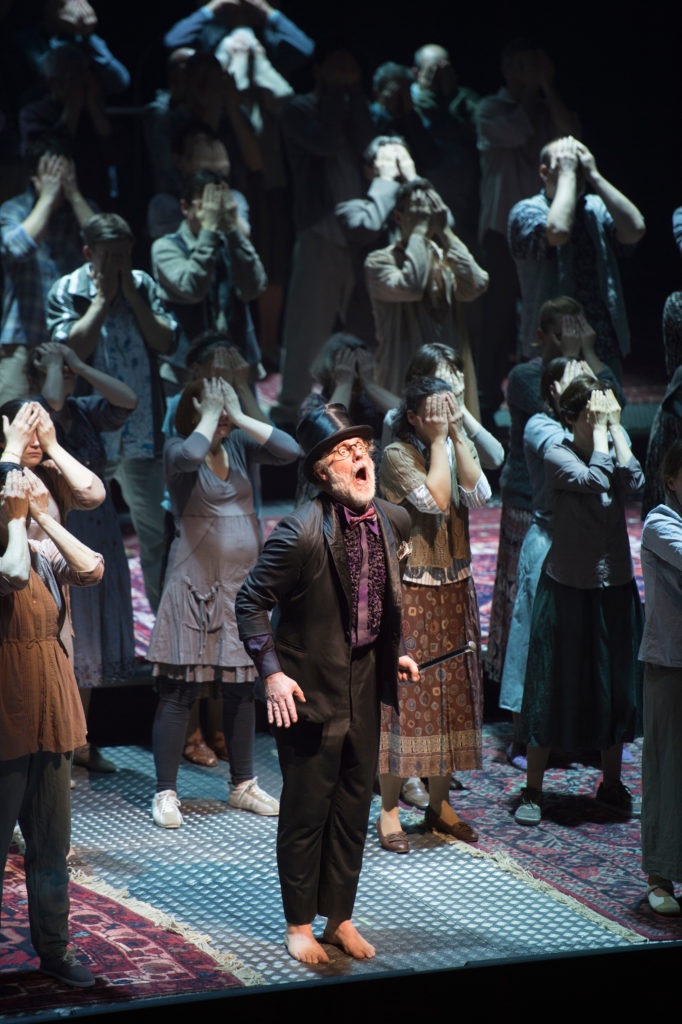
Robert Hayward as Moses in Moses und Aron, Komische Oper Berlin, 2015. Photo: Monika Rittershaus
The style of filming was very specific to online streaming; it wasn’t trying to be cinematic but did provide a different perspective than if one had been sitting in the back row on the top tier of the house.
Every theatre experience is different if you watch it live or filmed, and we were very lucky when we decided during my time at KOB that we would do livestreams and we would record them. I think the other big house that has a library for livestreams is Munich (Bayerische Staatsoper), in terms of being able to just release productions during the last few months, but my job is to try and entice people to Berlin eventually, so if thousands of people have seen these productions in the last few months, maybe some are thinking, “Oooh I want to go to Berlin, what are they doing right now?” It’s all connected.
I shared the link for Die Perlen der Cleopatra to a friend who is writing a musical and although he doesn’t know the KOB’s work he loved it and was curious to see more.
That’s great! I think for non-Germans, in terms of seeing operetta or musicals done on that scale, you just don’t see it anywhere else quite like that.
We’ve spoken about operetta in the past, and it’s nice to see it as part of your autumn programming.
We do need laughter right now. What I’ve found amazing the last few months is, at the beginning, when the shock of the lockdown was dissipating – we had our lockdown so early – various things came online and people started to play, and it was terribly lamento, this self-indulgent thing of “it’s the end! I’m playing the saddest most depressing music I could imagine to share with you across the world!” And I’m thinking, you know, it’s not a requiem we’re dealing with. I think we can still assume, when we weren’t playing, and then when we do play, we want to present a spectrum of music theatre experiences, so to balance the Schoenberg and Iphigenie, (KOB) had to do an operetta with the ensemble, because by the time we get to October we’ll have to have some laughs along the line. That’s not to make any light of any situation or of the hundreds of thousands of deaths, but we’re going to have to not just sit here and think it’s the end. Because it isn’t the end.
It’s felt that way for many – there’s been a lot of despair because of the pandemic situation.
Yes but I think we’re also got to realize it’s all about perspective. The Western idea of despair is not on the scale of despair on other continents. Historical despair… you know, a lot of the sort of, German cultural scene at the moment is railing against the idea of wearing masks and think it’s hysterics and whatever, the whole discussion is about, “are my freedoms and rights being taken away by being told to wear a mask in shops and on public transport” and I think, if your definition of the loss of freedom and rights is about wearing a mask to maybe not infect someone else in society, then you need to go and live in a country when freedom and rights are really under threat. That to me is another issue of this whole thing.
I said to my house as part of an internal video that I think it’s very important we have a perspective about this, and that it’s very easy to sink into a negativity – you can sink into a frustration, but as I said at the beginning, you know, outside the Western European cultural system, it’s terrible – orchestras, dance companies, institutions that have been developing for decades are under existential threat, and I think sometimes it’s better if you’re lucky to either help people or to shut the fuck up.
… or whinge on the internet?
The internet is the great whinge forum of all time! I don’t mind people being frustrated, I can understand it, and also understand I speak from a privileged position, and I’m very careful about that. I think crises always bring out the best and worst of people. It’s interesting to run a house when you’re successful, it’s also interesting to see how stable the ship is if you’re in a storm. That’s also interesting.
You’re hoping to leave something of a stable ship at KOB in the near future, then?
I leave in two years, but I sort of don’t leave, because I’m still staying on to do my work and as an advisor. I’ll be looking after the whole renovation project for two years, my team I’ve been working with are taking over the house so there’s continuity there but it’s a chapter finishing, and the last thing I want to do is hand over an institution that isn’t strong and creative.
I feel like this whole lockdown experience has been such an exercise in humility for many.
It still is, and everyone’s in the same boat. Salzburg, it’ll be interesting this summer to see what happens there in the laboratory of Salzburg, but that’s also not quite the reality, because Salzburg is a summer festival. At the Felsenreitschule where they’re presenting Elektra, there is no pit, it’s a huge, open area, so they don’t have to deal with musicians and big orchestras in pits and big choruses and hundreds of people backstage – they don’t have to deal with any of this. So I’m skeptical of it being used as a template of how the future will be. I wish them well, but it has nothing to do with what we’re doing or the challenges we face.
… or the audiences you have.
The average age in Salzburg is 345; we are considerably younger than that.
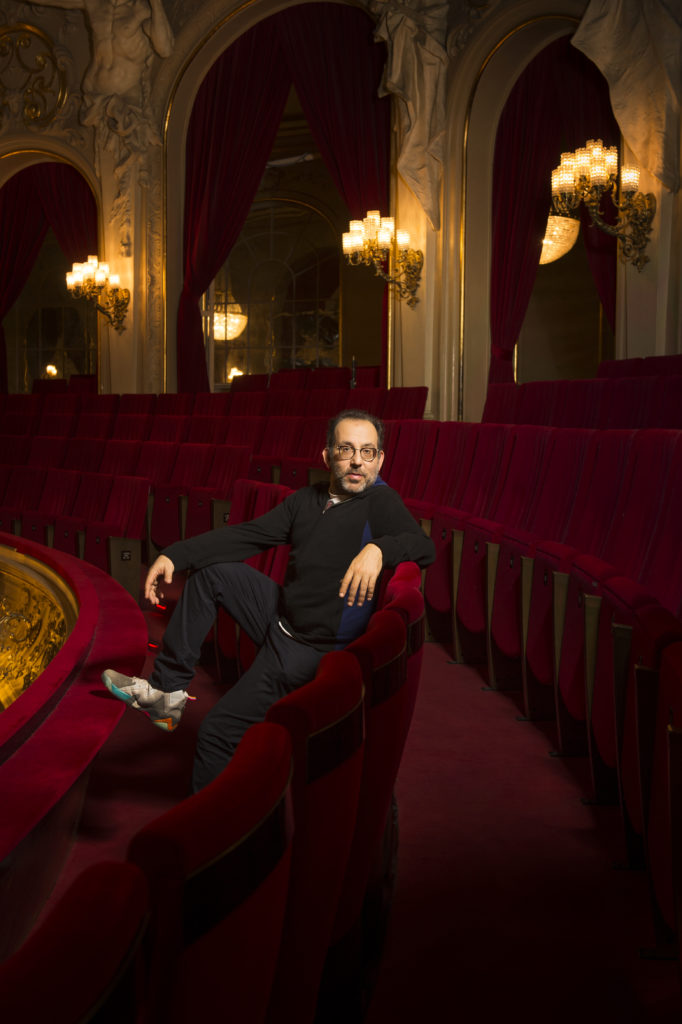
Photo: Jan Windszus Photography
And your Der Rosenkavalier is still in the books next year in Munich.
We won’t be changing it. If we have to do social distancing, it’ll be postponed. I can’t do with it what I’m doing with Boris Godounov in Zürich – the chorus and the orchestra will be beamed into the opera house live, and the singers and extras will be doing a strange, dreamlike production live, but I can do that with Boris Godounov because it’s fragmented anyway, it’s about history and how we remember history, so conceptually, fine – that’s not how I conceived it, but it’s fine.
But with Rosenkavalier, no! The opera itself is impossible to do with any form of social distancing, and it’s impossible to play in a smaller orchestral ensemble. They’re building the sets so it’s not as if it won’t happen. But as I said, I refuse to get into a situation where it’s, “Oh no my precious Rosenkavalier, it simply must be done!” – yes, I’d be devastated if it didn’t happen, but if it doesn’t happen in February-March, well, they’ll have to do it at some time; they’ve invested so much in costumes and sets already. I really want to do it next year, but it’s impossible to know what’ll happen, and they know that. Some of these productions we’re planning are impossible to do with restrictions, but I’m not even thinking about next year. January the 1st is not on my radar.
So it’s an exercise in non-attachment then?
It is. And the good thing about Rosenkavalier is that the work had all been done before corona – we’ve been working for three years on it, three-and-half years in fact. And it was all sort of finished in terms of the large concept – that was finished, but now it’s how it’s to be done, working it out in rehearsals, as you know. So it’s Strauss, and Rosenkavalier, and it’s Kosky’s Rosenkavalier, and in Munich: throw everything and the kitchen sink into it! And yes, there’ll be a lot of surprises in that one.
But first some surprises in the autumn in Berlin…
I think what’s happened in the German-speaking world is there are two thoughts: one thought is to bury your head in the sand and say, “It’ll all be fine and we’ll deal with it after summer; just wait and see” and… I don’t think that’s the way to do it. Some of the larger houses are doing that. But the other thought is to ask: how far ahead do we want to imagine this will have an impact on us? The Met cancelled my Fiery Angel I was meant to come for a month to New York to do – which I am sad about. I was going to go to Tel Aviv to do Magic Flute also, and it got cancelled.
So when the lockdown first happened, I thought, “I’m in Berlin, and that’s good; it’s good to be with my house” and I said, “I think we have to just scrap everything.” So we postponed the three premiers that were to happen this season: Katya Kabanova, the children’s opera Tom Sawyer, and (Rise and Fall of the City of) Mahagonny, which are going into 2021-22. We cancelled four revivals as well. For me it’s more interesting not to adapt or reduce – that terrible word – existing repertoire, but to start from scratch, to invent things, do new things, all with social distancing. The biggest thing is smaller audiences –okay, that’s one thing, but the social distancing with an orchestra and ensemble, that’s the tricky thing. I said, “Let’s see what we can do; do I want to do this in a year’s time? Or for a few months’ time next season? I’ll have to do it.” And the only way we can do this and have the luxury to do it, is because I have 105 orchestra musicians, 60 chorus members, and 24 singers, all on salary. And I said “okay, we won’t have any sets; we’ll have a bare stage but we’ll invest in lights and costumes” and I’ll be in the rehearsal room with my company creating things. The alternative is to say, “We can’t possibly present anything” and that’s not an option if you’re being paid millions and millions of Euros in taxpayer money. It’s not an option.
It’s a sharp contrast to the North American system.
It costs money, that’s the thing. We have a 90% subsidized system here and we also have ensembles, which don’t exist in North America, They can’t do anything. And they actually save money by not investing money – of course they could put on this and that but it’ll cost money, and as you know, it’s all box office, box office, box office, so it doesn’t make sense to have a few hundred people in the theatre…
Or outdoors.
Right, it still costs. I know from discussions with my colleagues in North America, yes, as you said before, they look over here with extreme jealousy. We know where the biggest costs in opera go – they go to salaries of orchestra, chorus, and singers; it’s a very different discussion being had in North America and Britain, and as I said, within the subsidized system we are even more lucky because we are a repertoire-based ensemble house; we are not having to pay a lot of guest singers.
When I spoke with (KOB Kapellmeister) Jordan de Souza near the start of the lockdown (for Opera Canada’s summer 2020 edition) he explained how rescheduling singers and guests is a tremendous jigsaw because cancellations mean constant changes.
It’s not a jigsaw; it’s a domino set, and it’s always falling! Jordan is absolutely right though, you deal with cancellations and the new plan, and then of course the longer it goes on the more problems it creates because someone is suddenly not available, they’re meant to be here, or they’ve been postponed, or “oh that’s still happening, we’re changing the version, are you free then?” It’s been a nightmare of coordination. A nightmare! And that’s why I did what I did: by sweeping everything off and concentrating on one thing, it instantly creates a new situation.
The difficulties are with next year; the more there are postponements and cancellations, the more it gets really complicated. In Berlin we decided to keep the workshops open; they’re building all the sets for all the new productions as per normal because if we don’t do that we get into a situation where you can’t just switch on a machine and build a set in two weeks. Secondly, there’s a few hundred people not working and they need to, as a purely psychological exercise in saying, “These sets have to be built.”
So you don’t really have a proper summer…
I’m rehearsing Pierrot, but I do have two weeks’ holiday in Greece. In quarantine I had seven weeks off, which is the longest I’ve had off in thirty years.
It was nice to see you accompanying various KOB ensemble members on the piano over the course of the lockdown.
That was an easy thing to do, they’re great people. It started with Katherine Mehrling doing the Kurt Weill songs, there was something like 15,000 people who saw it. We saw that number and went, “oh! Let’s do it every two weeks then, and feature people associated with the house!” I didn’t want it to be… I mean, you look at other houses, and their livestream musical presentations with no audience are treated like a funeral. That’s why we called ours celebrations, like, “here’s a little taste of something and we hope you enjoy it” – I wasn’t making any great statement about the times we live in, I just wanted to show people we’re still there and we’re thinking of them. They were fantastically successful, but after five we said “that’s enough, we have to get back to working” but also, I play the piano very rarely in public, and so I get such enjoyment out of doing it, particularly when accompanying. I’m not interested in playing solo, I just like playing with great people. I feel happy and secure when they’re in front and I’m playing away behind them – but also it’s a middle finger, to show people around the world who assume directors aren’t musical or that directors don’t know or care about music. All of that is nonsense. Sometimes it’s good to remind people of that.
You read the work of Joseph Roth as part of an early episode in Daniel Hope’s ARTE series at the start of the lockdown; that reading began with your dedication to people who were enduring the lockdown alone. I must confess when I heard you say that, I stood in my kitchen and wept with gratitude – it was very special to feel seen during that time.
I have a number of friends who are between partners, or don’t have partners or families or whatever, and were doing it alone, particularly the first part of it, and I kept thinking, “Oh my god, a few days and nights fine, but for weeks and weeks and weeks, that’s quite tough” – especially in some countries that had very severe lockdowns. So I really felt for a number of my friends. And I thought about the time when I didn’t have a partner or whatever, and I have a dog too, which helps – the dog has to get out and have a pee – but I thought about those who were alone, I mean… oh, that’s quite hard. We all love being alone at various times; I love being alone in my apartment or walking my dog, but weeks and weeks and weeks and weeks of it… my God.
So it just came to me, I mean, I so love Joseph Roth, and I love everything about his writing and everything about him; he was this sort of solitary journeyman going on trains through Europe and staying in hotels. Actually a few minutes before we went on, I said to Daniel, “Can I say something?: and he said, “Whatever you like!” He was playing something beautiful and melancholic just before, so it was a spur-of-the-moment thing, but I’m glad I did it.

